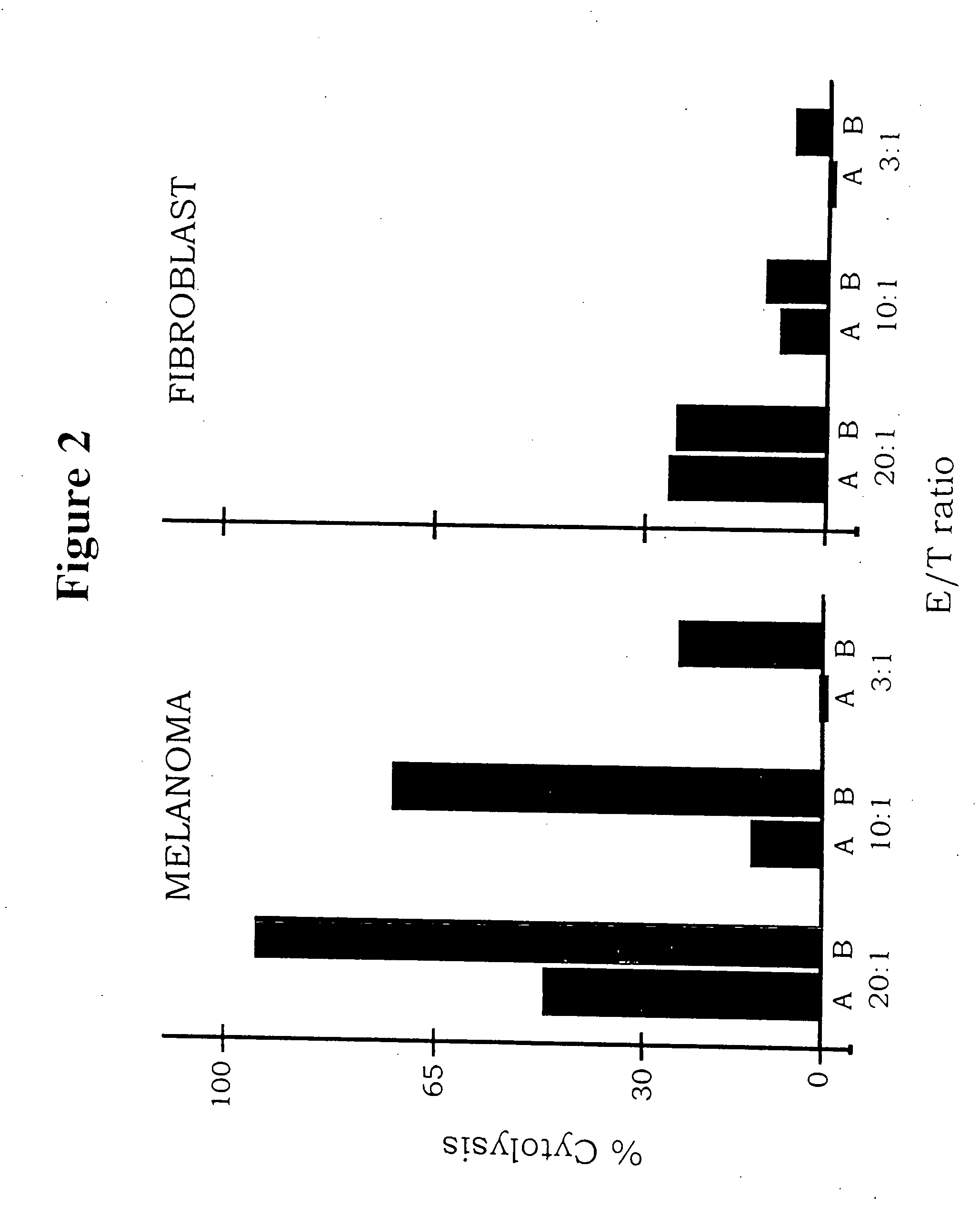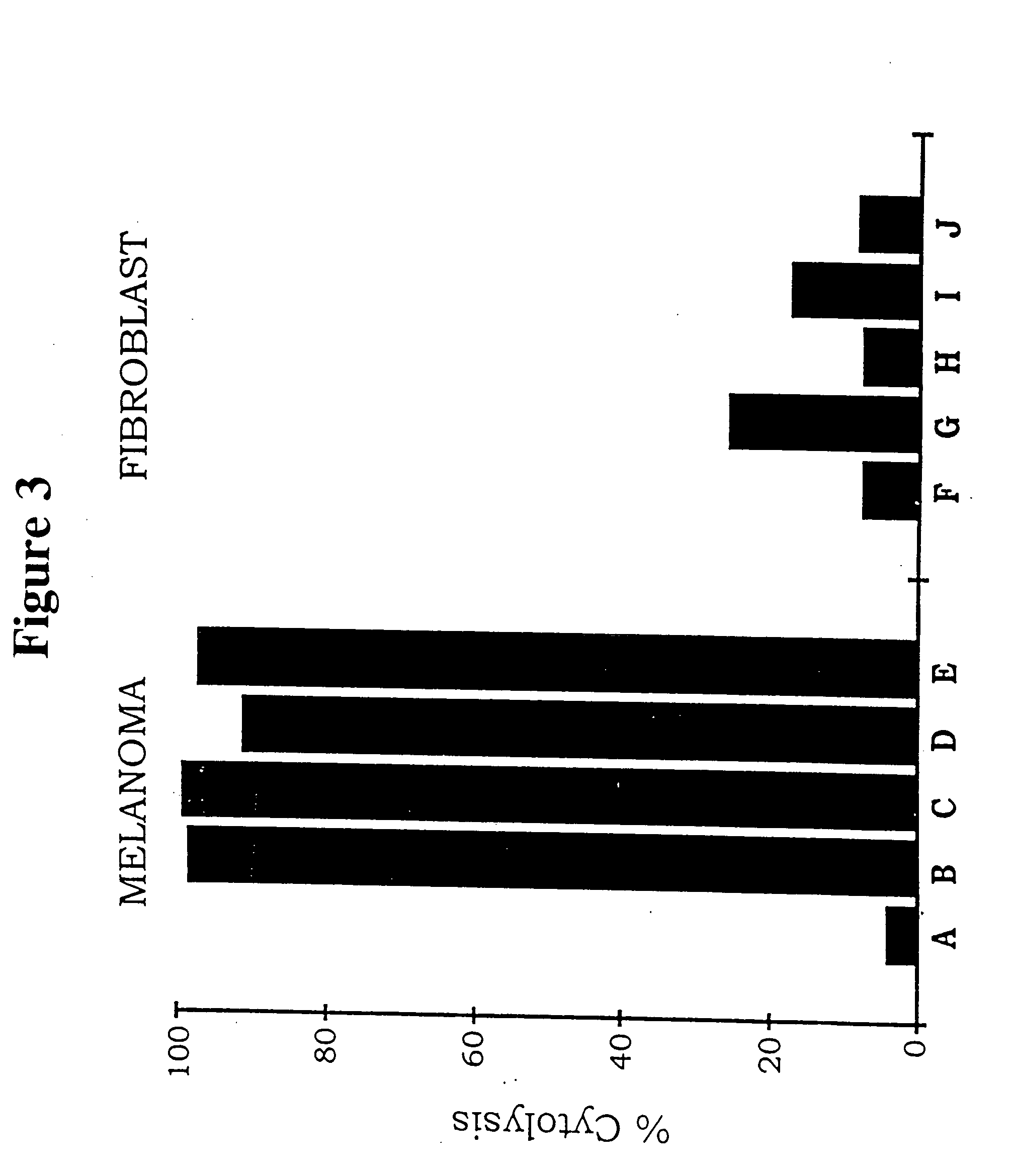Neovascular-targeted immunoconjugates
a technology of immunoconjugate and neovascularization, which is applied in the direction of peptides, drug compositions, angiogenin, etc., can solve the problems of triggering the death of many dependent tumor cells, synovial inflammation, and eventually joint destruction
- Summary
- Abstract
- Description
- Claims
- Application Information
AI Technical Summary
Benefits of technology
Problems solved by technology
Method used
Image
Examples
example 1
[0046] Immunoconjugates containing a human single-chain Fv (scFv) targeting domain conjugated to the Fc effector domain of human IgG1 are synthesized and tested in this example. The scFv targeting domains were originally isolated as melanoma-specific clones from a scFv fusion-phage library, derived from the antibody repertoire of a vaccinated melanoma patient (more fully described in the Cai and Garen references cited above). The purified immunoconjugates showed similar binding specificity as did the fusion-phage clones: Binding occurred to human melanoma cells but not to human melanocytes or to several other types of normal cells and tumor cells.
[0047] Materials and Methods. Cell cultures. The permanent human melanoma lines A2058 (American Type Culture Collection, Rockville, MD) and TF2 were grown in DMEM+10% FCS. Primary cultures of human microvascular endothelial cells and fibroblast cells were extruded from newborn foreskin and cultured in RPMI medium supplemented with 8% FBS a...
example 2
[0066] This example reports that an immunotherapy treatment for cancer that targets both the tumor vasculature and tumor cells has shown promising results in a severe combined immunodeficient mouse xenograft model of human melanoma. The procedure involved systemic delivery to SCID mice of two immunoconjugates, each composed of a tumor-targeting domain conjugated to the Fc effector domain region of a human IgG1. The effector domain induces a cytolytic immune response against the targeted cells by natural killer (NK) cells and complement. The imrnunoconjugates are encoded as secreted molecules in a replication-incompetent adenoviral vector.
[0067] Materials and Methods. Cell lines. The melanoma cell lines LXSN, TF2 and LXSN / VEGF were derived from the human melanoma line YU-SIT1 by retroviral-mediated transfection and cloning. The LXSN line was transfected with the control retrovirus and expresses a low level of TF. The TF2 line was transfected with a retrovirus encoding TF cDNA and ex...
example 3
[0082] This example reports a study of the efficacy and safety of a protocol for cancer treatment tested in a SCID mouse model of human skin and metastatic lung melanoma, and in an immunocompetent mouse model of mouse melanoma. The protocol involved intratumoral injections of replication-incompetent adenoviral vectors encoding immunoconjugates of the invention that elicit a cytolytic immune response against the targeted neovasculature endothelial cells and tumor cells. The mouse model experiments showed that intratumoral delivery of the factor VII immunoconjugate, either alone or together with the single-chain Fv immunoconjugate, resulted in growth inhibition and regression of the injected tumor, and also of distant uninjected metastatic tumors, without evidence of damage to normal organs. There was extensive destruction of the tumor neovasculature, presumably mediated by the factor VII immunoconjugate bound to tissue factor on neovasculature endothelial cells. Because tissue factor...
PUM
| Property | Measurement | Unit |
|---|---|---|
| volume | aaaaa | aaaaa |
| mass tolerance | aaaaa | aaaaa |
| mass toerance | aaaaa | aaaaa |
Abstract
Description
Claims
Application Information
 Login to View More
Login to View More - R&D
- Intellectual Property
- Life Sciences
- Materials
- Tech Scout
- Unparalleled Data Quality
- Higher Quality Content
- 60% Fewer Hallucinations
Browse by: Latest US Patents, China's latest patents, Technical Efficacy Thesaurus, Application Domain, Technology Topic, Popular Technical Reports.
© 2025 PatSnap. All rights reserved.Legal|Privacy policy|Modern Slavery Act Transparency Statement|Sitemap|About US| Contact US: help@patsnap.com



